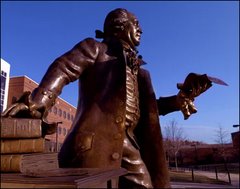
Martin Scorsese left an indelible mark on the gangster genre beginning early in his career. He once said of the Mafia, “The lifestyle is so rich—I have a love-hate thing with that lifestyle.” (Smith, 197) Mean Streets and Taxi Driver journeyed through the criminal underbelly of New York and previewed what was to come later in his career. In 1990, Goodfellas burst onto the scene, and allowed for the audience to fully enter the Mafia world for the first time; viewers were not simply witnessing a fictional event, they felt welcomed into the family. David Chase chose to emulate this narrative structure with The Sopranos, combined with intrusive, voyeuristic cinematography. The Sopranos brought something new that modern television had yet to see, “Chase and HBO have chosen to defy network conventions and deliver a television show that brilliantly illuminates what it means to be human.” (Gabbard, xi) But the similarities do not end there. In fact, David Chase owes much to Martin Scorsese regarding the superficial elements such as actors, locations, props, and music. More importantly, the underlying recurring themes and motifs prevalent throughout Scorsese’s films, including family, responsibility, authority, love and loss, and respect all exist within The Sopranos. I will address these similarities and comparisons and explain how Martin Scorsese’s Mafia films inspired the creation and success of The Sopranos, a post-modern gangster epic. Read the rest of the article.


No comments:
Post a Comment